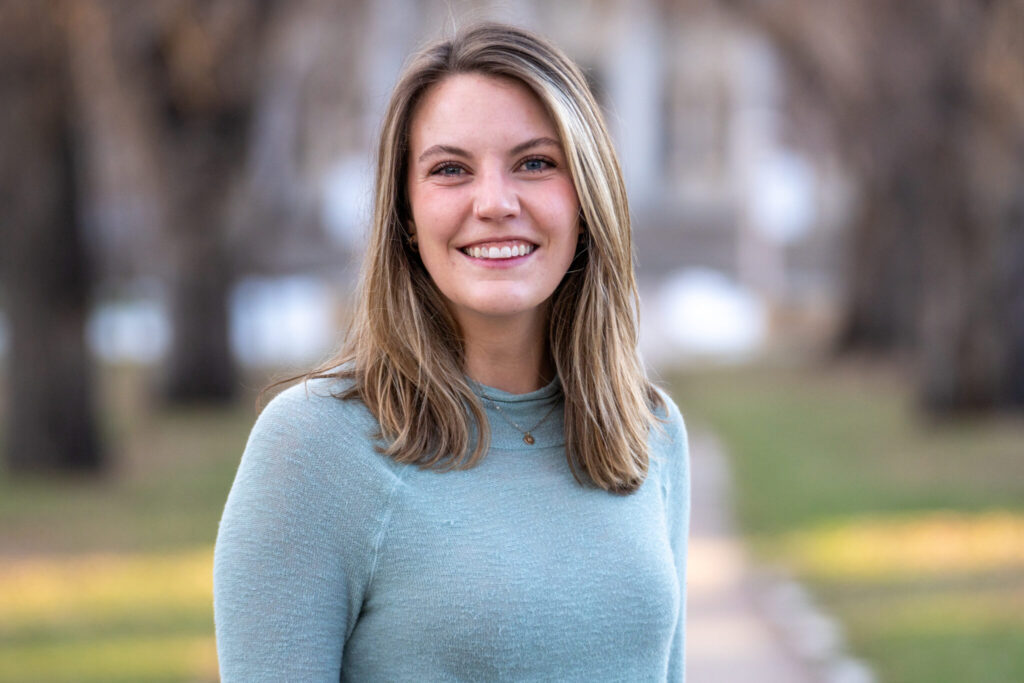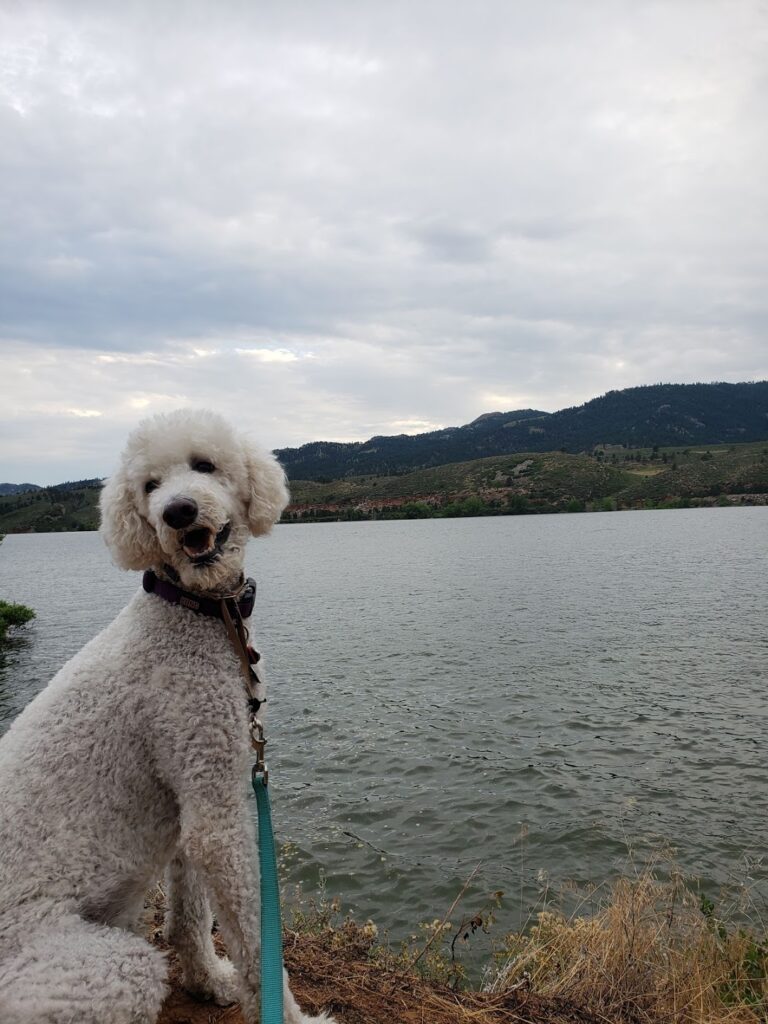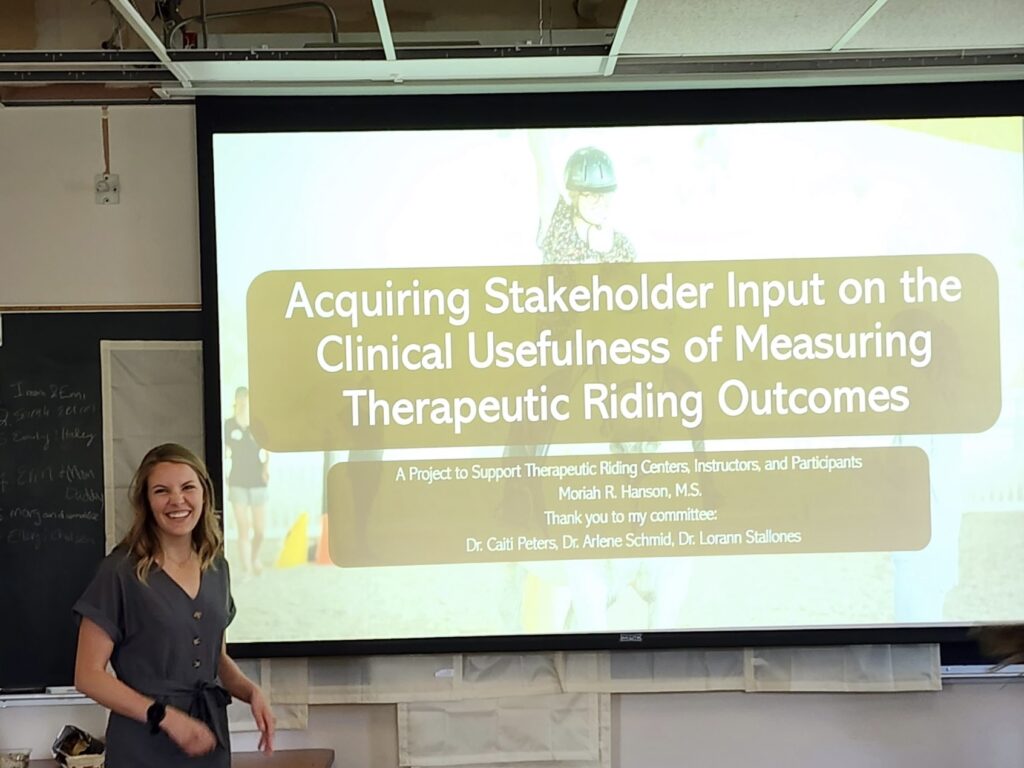
Moriah Hanson (health and exercise science B.S. ’17, M.S., ’19 ; M.S., occupational therapy, ’23), an outstanding Department of Occupational Therapy graduate, first discovered her love for Fort Collins and Colorado State University in her senior year of high school. Soon after, she declared her major in CSU’s Department of Health and Exercise Science and found her new home an hour north of her hometown of Arvada, Colorado.
Little did Hanson know at the time, this would be the first of three degrees she would pursue at CSU, all with the mission of enriching human health and wellbeing.
“Throughout undergrad, I knew that I wanted to work with people in health care and had hopes of going to school for occupational therapy, but I loved my HES coursework,” she said. “I felt like I was just getting started in learning about the human body, particularly the way our nervous system functions to allow us to move, so I decided to stay in the HES department for a master’s degree.”
After earning her master’s degree in 2019, Hanson moved from Fort Collins, then returned in 2021 with her sights still set on earning her occupational therapy degree.
“I’ve had a long journey at CSU, and I wouldn’t have it any other way,” Hanson said.
Enduring hardships and receiving support
As she was hitting her stride in the Occupational Therapy Program, Hanson found herself in the face of calamity.

“In winter 2021, my house caught fire, and my roommate and I navigated shifting living situations in the midst of winter, school obligations, and catching COVID-19,” Hanson recalls. “We stuck together to problem-solve our housing and were incredibly blessed to have friends who provided us with temporary housing, a professor who facilitated a semester-long living situation, and our dog, Strider, who was rescued by Poudre firefighters.”
Despite the adverse circumstances, Hanson bounced back with the aid of her supportive community of colleagues, faculty, and mentors. Brian Butki, associate professor in the Department of Health and Exercise Science, helped significantly when he and his family provided Hanson and her roommate with temporary housing, acting as their landlord and assisting them with any issues they would face.
“Additionally, my OT instructors and mentor, Dr. Caiti Peters, were incredibly flexible as I tried to remain caught-up with coursework and research endeavors while navigating the consequences of the fire,” she said.
Back on her feet, Hanson proceeded to flourish in her studies, making research one of her top priorities. Occupational Therapy Assistant Professor Lisa Fyffe took note of Hanson’s work ethic and positivity.
“Moriah approached her work with a smile and graciousness even when she was under a tremendous amount of stress,” Fyffe said. “She brought energy and curiosity to each class session and excelled at all tasks asked of her.”
Conducting research and solving problems
Alongside her mentor Peters (’15, ’18), a licensed occupational therapist and faculty member in CSU’s Departments of Animal Sciences and Occupational Therapy, Hanson explored solutions to enhance the adaptive horseback riding (AR) experience by providing standardized assessments to certified therapeutic riding instructors (CTRIs). Their interdisciplinary research connected a group of collaborators both on and off-campus including the Temple Grandin Equine Center and the Professional Association of Therapeutic Horsemanship International.
AR is a recreational activity during which horseback riding is adapted to the needs of diverse participants such as children with disabilities, veterans, and older adults, and CTRIs are the professionals who provide AR services. In many AR settings, CTRIs do not have access to standardized assessments to measure the outcomes of their services.
“My thesis was the first step in a research program aimed at identifying standardized assessments which CTRIs could use to measure outcomes,” Hanson said. Peters and Hanson created a survey that was distributed to CTRIs and other AR professionals, seeking to determine whether they would be willing to implement standardized assessments, what participant characteristics or experiences they would like to measure, and the time and format they would require of standardized assessments for use in their AR setting.

“We found that CTRIs are generally willing to implement outcome assessments, that they would like assessments that measure a variety of outcomes to meet their clients’ needs, and that the assessments should be low-cost or free, take less than 20 minutes to complete, and be available both electronically and on-paper,” said Hanson.
The team used the results of this study to pilot test several outcome assessments at AR centers and develop focus groups to problem-solve outcome assessment implementation. The study was recently published in the Frontiers in Veterinary Science journal.
“Our ultimate hope is to promote the field of AR through supporting CTRIs and AR professionals in communicating the benefits of their services to current and potential participants, funders, and the public,” Hanson said.
A future advancing health and wellbeing
Reflecting on her journey, Hanson has nothing but love and gratitude for her CSU family.
“My fondest memories of my CSU experience are the relationships I have developed here,” Hanson said. “In both the health and exercise science and occupational therapy departments, my mentors have provided me with opportunities that have led to my final graduation. These people include HES faculty Brett Fling, Matt Hickey, Chris Bell, and Brian Tracy, and OT faculty Caiti Peters, Arlene Schmid, Lisa Fyffe, and Jaclyn Stephens – each of these individuals has shaped my journey and given incredible support that allowed me to complete my degrees.”
While Hanson looks forward to fulfilling her dream of integrating her health science background with occupational therapy practice, “I will miss the routine of seeing my classmates every day, learning from my instructors about their passions, and napping under the elm trees on the Oval on sunny fall afternoons,” she said.
Hanson’s next step is to find employment as an OT serving older adults both in their homes and in rehab facilities to gain experience in the field and promote healthy aging. Her ultimate goal is to have her own private practice.
Three degrees later, Hanson’s mission remains the same: supporting people in maintaining health and remaining positively engaged in their own lives.
The Department of Occupational Therapy is part of CSU’s College of Health and Human Sciences.